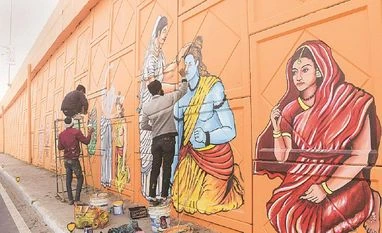The so-called “liberation” of Ram’s birthplace in Ayodhya has undeniably contributed to the political ascendancy of the Bharatiya Janata Party (BJP), although the strategies, campaigns, and popular mobilisation for the movement were orchestrated by the Rashtriya Swayamsevak Sangh (RSS) and Vishva Hindu Parishad (VHP).
The demand for a temple dedicated to Ram propelled the BJP to a dominant position in the north, particularly Uttar Pradesh, the west, and Karnataka in the south.
The Ayodhya Assembly seat, the epicentre of the Ram Janmabhoomi-Babri mosque dispute in the Avadh region, has been held by the BJP since 1993, with an interruption in 2012 when it was taken by the Samajwadi Party (SP). Even the pro-Bahujan Samaj Party (BSP) wave of 2007 didn’t disrupt the BJP’s hold on Ayodhya. The current MLA, Ved Prakash Gupta, is a former BSP member.
The Faizabad Lok Sabha constituency, which includes Ayodhya among its five Assembly seats, has been less predictable.
In 1989, as the temple issue gained traction, it was won by Mitrasen Yadav of the Communist Party of India. This victory was achieved through a broad understanding among non-Congress parties, including the BJP, to defeat the Congress.
In 1991 and 1996, when Hindu sentiment for the temple peaked and later merged with former Prime Minister Atal Bihari Vajpayee’s charisma and popularity, the seat was won by the BJP’s Vinay Katiyar, a leading figure in the movement. In 1998 and 2004, Yadav won the seat, first as an SP and then as a BSP candidate. In 2009, Faizabad was won by Nirmal Khatri of the Congress, but in 2014, it returned to the BJP. Lalu Singh, a six-time MLA from Ayodhya, was declared elected that year and in 2019.
As the tempo for the temple’s consecration in a pran pratishtha ceremony on January 22 intensifies daily — undeterred by the priests of the Puri, Sringeri, Dwarka and Uttaramnaya Jyotirmath Peeths staying out of it — the event has been imbued with significant political overtones, not just in UP but across the country. Prime Minister Narendra Modi will preside over the benediction with the RSS sarsanghachalak Mohanrao Bhagwat, UP Governor Anandi Patel, Chief Minister Yogi Adityanath, and Nritya Gopal Das, the Ayodhya mahant heading the trust responsible for the construction and management of the Ram temple.
“When the whole country converges in Ayodhya, naturally it will dominate the (Lok Sabha) polls,” said Katiyar.
Since 1991, the BJP has evolved beyond being a one-issue party focused on Ayodhya, but party sources suggest that the upcoming elections will likely revolve around the renewed enthusiasm for the temple unless another theme with religious and nationalist undertones emerges. After 1992, when the Babri mosque was demolished, the issue’s trajectory was uneven. While there was an undertow of Hindutva in the BJP’s election campaigns with the constant promise of building a “grand” temple if voted to power, even in UP, the issue never resonated strongly. If the 2014 parliamentary poll and the subsequent contests marked a turning point for the BJP after a long period out of power, the comeback had more to do with projecting Modi's persona and politics and crafting smart caste alliances than the temple.
When asked how Ayodhya would play out four months from now, UP BJP Spokesperson Harish Chandra Shrivastava began by saying: “It’s a matter of devotion for the Ram bhakts like the Kumbh Mela. Political affiliations are different. We will see bhakts coming from West Bengal and Tamil Nadu to worship Ram, but they won't necessarily vote the BJP.”
He then got to the heart of the matter. “The Opposition has politicised the matter by rejecting the invites for the ceremony. People have observed closely, and there will be a counter-reaction in the polls. Those who raised the matter and worked hard for the temple will naturally get the credit and that is us, from the BJP.”
Brijesh Singh, a transporter from Faizabad and former district functionary of the Congress who defected to the BJP in 1990, proclaimed: “The glory of Ram is beyond comparison. All, including Dalits and backward castes, will vote for the BJP, with the exception of a few scattered Yadavs. Despite the Congress’ Sonia Gandhi declining the invitation, I predict a significant turnout from Congress members for the consecration.”
Nirmal Khatri, twice elected from Faizabad as MP on Congress ticket, confirmed his non-participation, stating: “This is mere tamasha (spectacle). The temple construction is incomplete, yet the BJP is proceeding due to the impending elections. Our central leadership decided against attending this political event, and I abide by that decision.”
Khatri criticised the decision of UP Congress leaders to bathe in the Sarayu and visit the Ram temple on January 15. “This is wrong because they have violated the central command’s line.” SP chief Akhilesh Yadav also declined the invitation, declaring, “Our deities are the PDA: pichhade (backward castes), Dalits, and alpasankhyak (minorities).” In response, VHP working president Alok Kumar retorted: “Perhaps his conscience is haunted by the events of 1990.” This was a reference to the order given by Akhilesh’s father, Mulayam Singh Yadav, for police to open fire on kar sevaks when they first stormed the heavily barricaded mosque that year.
Sunil Rohta, spokesperson for the Rashtriya Lok Dal and SP ally, defended his leader Chaudhary Jayant Singh's decision: "We will visit the temple, but we refuse to attend a BJP-hosted event designed solely for political gain."
That was the Opposition’s only defence — a matter of faith has been completely “politicised” by the BJP.
Unlock 30+ premium stories daily hand-picked by our editors, across devices on browser and app.
Pick your 5 favourite companies, get a daily email with all news updates on them.
Full access to our intuitive epaper - clip, save, share articles from any device; newspaper archives from 2006.
Preferential invites to Business Standard events.
Curated newsletters on markets, personal finance, policy & politics, start-ups, technology, and more.
)